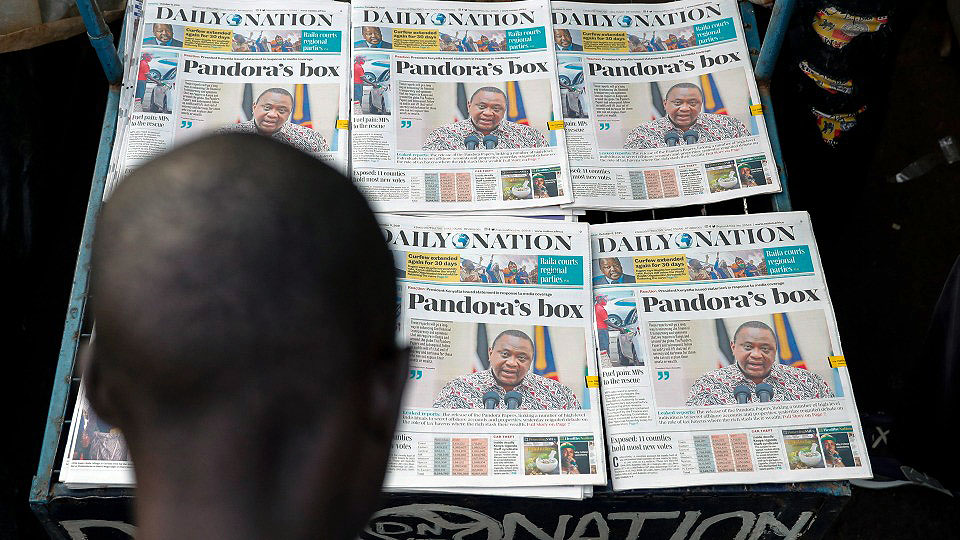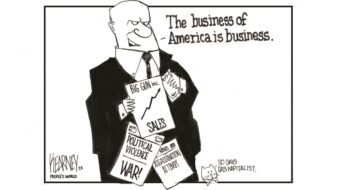
For years, Sens. Bernie Sanders, Ind-Vt., and Elizabeth Warren, D-Mass., have proclaimed “the system is rigged” by the 1% in the U.S., against you and me. It turns out they’ve understated the case.
The extensive disclosures and data produced in the Pandora Papers, the latest exposure by the International Consortium of Investigative Journalists (ICIJ), on top of two prior series of stories, show the 1% have rigged the system around the globe.
Using tax havens from Panama to South Dakota and trusts to shelter income and assets from levies, the rich and their corporations have secreted trillions of dollars away from disclosure. And financial analysts point out they’ve done it perfectly legally.
How? They manipulate the tax laws to allow such secretive arrangements, convince or co-opt regulators to turn a blind eye and use their ill-gotten gains to elect or install sycophantic governments to let them get away with financial finagling.
Such rigging of our systems affects the rest of us because we must pick up the tab while the corporations and the 1% avoid shouldering their fair share of society’s costs.
Meanwhile, our governments are short of the money to properly care for us, our elderly relatives, and our kids; to rebuild infrastructure; to battle climate change; to create Medicare For All; and to pay workers living wages, among other goals.
“Findings suggest South Dakota alone has sheltered billions linked to wealthy individuals previously accused of serious financial crimes and labor violations,” Chuck Collins, inequality program director for the Institute for Policy Studies and author of a comprehensive book on how the rich shelter their wealth, said in a statement. The actual figure in South Dakota: $367 billion.
“Two examples: Brazilian orange juice baron Horst Happel was fined $88 million in 2016 for underpaying his workers. In 2017, he moved substantial wealth to a trust in South Dakota.
“And Carlos Morales Troncoso, the former vice-president of the Dominican Republic, ran Central Romana sugar company, which was accused of human rights violations. He set up trusts for his daughters in the Bahamas that were moved, after his death, to South Dakota.
“The reason global money flows to the ‘Mount Rushmore State’ is their low taxes and advantageous dynasty trusts,” Collins says. Right-wing Republicans are responsible for both.
Which brings up another point: Right-wing control of such tax havens, abroad and at home. Of the 206 shady trusts in U.S. states, 81 were in deep-red South Dakota. Two of the next four states housing such schemes are also right-wing Republican-run, Florida and Texas.
“The Pandora Papers will hopefully boost momentum in Congress behind a progressive tax plan to fund the Build Back Better program—including money for IRS enforcement to ensure the wealthy pay their fair share,” Collins said in his statement.
But here’s the problem: U.S. laws don’t reach tax havens such as Panama or the British Virgin Islands—and other nations whose systems are rigged the most. Even the proposals by Senate Finance Committee Chairman Ron Wyden, D-Ore., to crack down on corporate tax dodging stop at U.S. shores. Tove Maria Ryding, tax coordinator at the European Network on Debt and Development, said only a global solution can tackle the rigged global system.
“We’re in the midst of a global (pandemic) crisis, and it is more urgent than ever to crack down on international tax dodging. The Pandora Papers is a stark reminder we have a long way to go,” her statement said.
“It really is outrageous to see some of the politicians who pretended to crack down on dirty tax tricks and secret shell companies were in fact using them themselves. The only way to break this curse is to crack open the dirty secret corners of the financial system and ban harmful secrecy structures. It is time to put an end to anonymous shell companies, trusts, and similar creative structures.
“Partial, piecemeal transparency is not real transparency…. It is high time to expand the transparency and include owners of trusts and similar structures, too. It is clearly time to step up the global fight against international tax dodging and illicit financial flows…. We need an intergovernmental UN-led response to tax havens. This problem is draining billions of dollars from public coffers every year and we cannot afford to ignore it.
“If governments are serious about funding healthcare, education, and the fight against climate change, they have to show us they are ready to stop tax havens.”
It’s worth adding two more ideas: First, don’t just crack down on tax havens, outlaw them, along with other dirty financial dodges, especially hedge funds.
Hedge funds are secretive and hide wealth, just like the tax havens. But the hedge funds use wealth to buy and trash firms, sell their assets, close them down, and walk away with humongous profits for their secret investors, leaving behind shattered jobless workers and families in tears. Just ask The News Guild. It can provide illustrated horror stories on the subject.
A second addition: Confiscate the assets, from cash to castles, such entities hold while sending perpetrators, enablers—including their lawyers and lobbyists—and, yes, the real owners, to prison. It would be a fitting punishment for the rapacious bunch of plutocrats, potentates, right-wingers, corporate crooks, and avaricious billionaires.












Comments